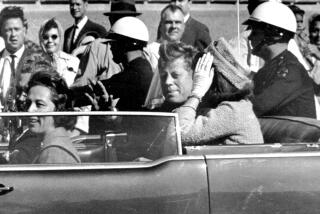Review: Ken Burns’ ‘The Address’ shows boys memorizing Lincoln’s words
- Share via
Ken Burns’ new documentary, “The Address,” which premieres Tuesday on PBS, is not at all what we have come to think of as a Ken Burns film.
There are no celebrity voices reading documents of the dead; no narrator reading the words of Geoffrey C. Ward; no team of experts to elucidate the American past or an American pastime; no Buck O’Neil to bring back a world lost, but remembered. No “Ken Burns Effect,” for that matter, the signature, all-but-patented, slow, close caress of old photographs that has taken his name.
Indeed, though the address at hand is the one Lincoln gave at Gettysburg, the past is barely present here. Rather, this moving “small” film is a contemporary piece, a fly-mostly-on-the-wall documentary about the Greenwood School, a Vermont boarding school where students — “bright and talented” boys from 11 to 17 with a range of “complex learning differences” — study, learn and publicly perform the Great Emancipator’s 272-word, 1863 battleground cemetery speech.
BEST TV OF 2013 Lloyd | McNamara
An optional tradition since the school’s founding in 1978, taking on “The Gettysburg,” as all here simply call it, is considered a “rite of passage” within Greenwood culture. Its rewards are a sense of accomplishment and self-mastery, intramural bragging rights and, tangibly, a commemorative coin.
“This year I’m reciting the Gettysburg, and that’s huge for me,” says Ian, much bullied before he came to Greenwood. “That just tells people I’m not stupid, I’m not dumb, I’m not, like worthless.... It’s the turn of a new beginning when that coin hits my hand.”
The students grapple with dyslexia, dysgraphia, executive function disorder, ADHD and various speech pathologies; some are angry, some withdrawn. The school for them is “often a place of last resort,” and though it’s not impossible they suffer here as well — to the extent we see them suffer, it is at their own hands — this is not investigative journalism, but a work of love. Burns, who lives in the neighborhood, first saw the school when he came to judge the Gettysburg recital — everyone’s a winner, but some win more than others — and this is clearly a personal, even a passion, piece.
Unlike Burns’ signature works — highly polished, high-budget, Bible-length PBS blockbusters, worked to a level of stateliness that at times is almost hermetic — “The Address” is ragged and homely; it feels homemade, even amateurish at times. The use of music — snatches of borrowed instrumental music, from French cafe to Peanuts Christmas — is surprisingly clumsy, and there are step-framing effects more redolent of a home video. But it is full of life and feeling; its rawness suits the subject, and helps rather than hinders Burns’ cause.
PHOTOS: Faces to watch 2014 | TV
He lets the camera roll at length in classrooms, common rooms and private conferences. It’s not quite Frederick Wiseman, in its willingness not to hurry, and Burns’ other films are hardly noted for their breakneck pace; but it’s leisurely by the attention-deficit standards of modern filmmaking. Indeed, “The Address” needs to stay settled in order not to mask the behavior of its subjects with its own hyperactivity.
The speech itself — a masterpiece of economical rhetoric that continues to outlive its own prediction that “the world will little note nor long remember what we say here” — emerges in fragments, as sentences and bits of sentences bounced from student to teacher and back and forth, or as glimpsed bits of private rehearsal. It’s parsed and analyzed to the roots of its words, and eventually emerges, as you knew it would, into a complete recitation, relayed from speaker to speaker.
For the most part, Burns, whose films have always put a (quietly) emotional spin on plain-spoken facts, resists the urge to sentimentalize. (He does slip in a bit of Spielbergean underscoring at the end of the scene where the students gather — at a fancy dress, crystal-and-silver dinner — to deliver their Gettysburgs, but you feel that he’s waited as long as he could stand it.) Rather, he gives his subjects respect, all the respect they need, by turning on his camera, sitting still, and watching.
-----------------------------
‘The Address’
Where: KOCE
When: 9 p.m. Tuesday
Rating: TV-PG (may be unsuitable for young children)
More to Read
The complete guide to home viewing
Get Screen Gab for everything about the TV shows and streaming movies everyone’s talking about.
You may occasionally receive promotional content from the Los Angeles Times.







